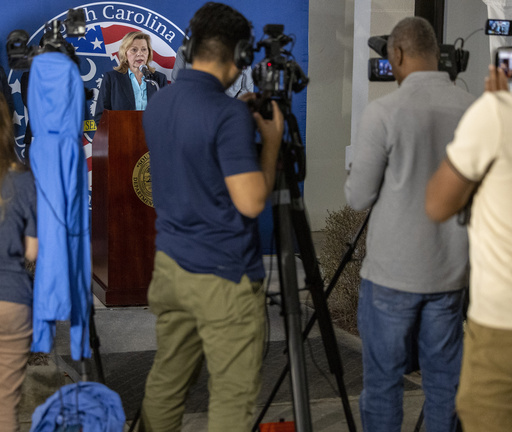
COLUMBIA, S.C. — South Carolina executed its third inmate in just four months on Friday, addressing a backlog of prisoners who had exhausted their legal appeals amid challenges in securing lethal injection drugs. Marion Bowman Jr., aged 44, was put to death at 6:27 p.m. He was convicted for the murder of a friend, Kandee Martin, whose charred remains were discovered in the trunk of a car.
Throughout the proceedings, Bowman consistently asserted his innocence, beginning his final statement with the declaration, “I did not kill Kandee Martin.” His defense team highlighted that his conviction hinged largely on testimonies from several friends and relatives, many of whom received leniency or reduced charges in exchange for their statements.
As the execution curtain was drawn, Bowman first glanced toward his attorney in the adjoining witness room, then turned his gaze skyward, closing his eyes. He intermittently opened them as he stared upwards. After his attorney completed a three-minute recitation of Bowman’s final remarks and a poem, he began to breathe heavily, ultimately taking his last breaths within a minute. About twenty minutes post-execution, a doctor confirmed his death with a stethoscope and a gentle pat.
In his concluding words, Bowman noted that while death row inmates are often perceived as the worst among society, many have evolved from the individuals they once were. “I recognize that Kandee’s family is enduring immense pain and anger,” he stated. “If my death can provide them solace and help them remember better times, then perhaps it will serve a purpose. I truly wish for their peace.”
For his final meal, which reflected his personal preferences, Bowman chose a variety of fried seafood items including shrimp, fish, oysters, chicken wings and tenders, onion rings, along with sides like banana pudding and German chocolate cake, complemented by cranberry and pineapple juice. Despite being on death row for over half of his life, he declined a plea deal that would have sentenced him to life imprisonment, maintaining his claim of innocence.
Bowman’s execution represents the third in South Carolina since September, effectively ending a 13-year moratorium fueled by difficulties in acquiring lethal injection drugs. Legislation allowing prison officials to source drugs from a compounding pharmacy, while keeping its identity confidential, has reinstated the state’s capacity to carry out executions.
This event marks the first execution in the United States in 2025, following 25 executions across the country in the previous year. Bowman did not seek clemency from Governor Henry McMaster, whose office released a letter rejecting clemency requests made on Bowman’s behalf.
Lindsey Vann, Bowman’s attorney, expressed that he was unwilling to remain imprisoned for an offense he did not commit. “After enduring over two decades of a flawed judicial system, Marion’s choice is a courageous rejection of an unjust process that has already claimed much of his life,” Vann remarked.
Historically, no governor has ever reduced a death sentence to life without parole in South Carolina since capital punishment was reinstated in 1976. Bowman’s conviction, stemming from the murder of 21-year-old Kandee Martin in 2001, was fueled by testimonies from individuals who either had charges dropped or received deals.
In court, one friend testified that Bowman was upset due to a monetary debt owed by Martin, while another indicated Bowman suspected that Martin was wearing a wire. Bowman acknowledged selling drugs to Martin, who he had known for years, but denied the allegations of murder. Both he and the other executed inmates share the same racial background, which Bowman’s defense claimed affected the fairness of his trial.
Concerns regarding Bowman’s health emerged during his appeals process, particularly about how his weight — recorded at 389 pounds (176 kilograms) — could complicate the administration of lethal drugs. An anesthesiologist raised alarms that the state’s secret lethal injection protocols might not adequately account for such factors, making the process challenging.
Before the lengthy pause in executions, South Carolina was noted for its high number of death sentences. After the state Supreme Court reinstated executions in July, three executions have taken place: Freddie Owens on September 20 and Richard Moore on November 1. The court intends to schedule executions every five weeks until the three remaining inmates with exhausted appeals are executed.
Since capital punishment resumed in 1976, South Carolina has executed 45 inmates. In the early 2000s, the state maintained an average of three executions annually, while nine other states have carried out more. Despite this, the population on death row has significantly decreased since the halt, dropping from 63 inmates in early 2011 to just 30 currently. Some individuals have had their death sentences overturned while others have died of natural causes.

